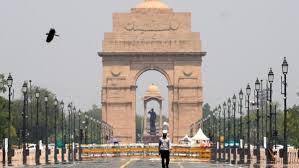Reign of fire: On Delhi and the high heat
New Delhi’s experience of high heat cannot be pinned on climate change.
On May 29, the Mungeshpur automatic weather station north of New Delhi recorded a maximum of 52.9°C. While the India Meteorological Department has since suggested that the station’s thermistor may be faulty, the country’s north has clearly been suffering scorching weather. After the recording was reported, New Delhi’s Water Minister imposed a fine of ₹2,000 on those washing vehicles with hoses and allowing water tanks to overflow, and said 200 teams would monitor for wastage. The temperatures people experience in a place are produced by a combination of factors, including public ventilation, density of built-up structures, and the availability of shade. How a person’s body responds to such heat is also mediated by several forces. But it has become the norm to blame climate change as the all-encompassing cause of the consequences of extreme heat, and thus argue that the governments’ only option is to react. The fact is that though New Delhi is large, it is smaller than the scale at which climate models reliably predict anomalous heat. Even if an attribution exercise concludes Mungeshpur’s temperature was related to climate change, no interstate cooperation or heat response mechanism exists to act meaningfully on the finding.
According to New Delhi’s new orders, the monitoring teams have been empowered to sever illegal supply lines, placing those in informal settlements at risk. For this to be fair, the city must already have ensured all its residents are sufficiently supplied with legal connections. Equally, 200 teams are too few for a city of its size. Together with there being no effective way to scrutinise water use in private properties, their mandate amounts to little. The city’s peak power demand also crossed 8.3 gigawatt on May 29; high heat increases water consumption at power generation facilities. New Delhi has a heat action plan but the city’s present response suggests it does not accommodate externalities such as the availability of water from neighbouring Haryana and illegal supply connections. Such plans should also include passive, long-term measures that ensure life can go on irrespective of the ambient temperature. With respect to water, for example, cities could maintain a reservoir for emergencies, a distribution system that resists tampering, and municipal body teams that conduct surprise wastage checks year-round rather than intermittently. Similarly, instead of shutting schools and offices to avoid peak heat, as many action plans stipulate, governments should facilitate cooling by (traditional) architectural methods, set up shaded pedestrian corridors, and incentivise the use of air-conditioned public transport. Governments are answerable to the terms on which they expect people to cope with the heat.
